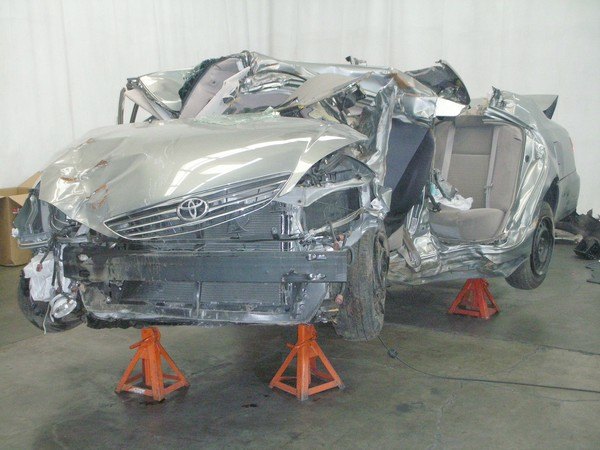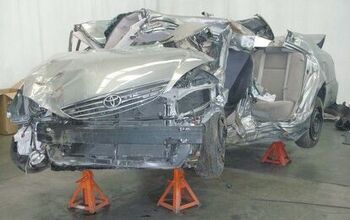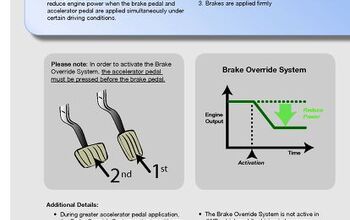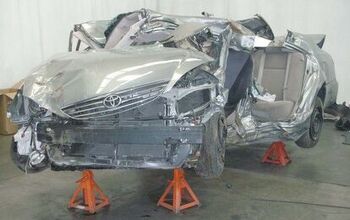Toyota Unintentional Acceleration Wrongful Death Trial Begins
Noriko Uno was killed in 2009 when her 2006 Toyota Camry sudenly accelerated to 100 MPH, resulting in her leaving the roadway and hitting a telephone pole and a tree in the median. Today, jury selection begins in a California lawsuit filed by her survivors.
The lack of a brake-override system on her Camry, a device that Toyota has since implemented, is expected to be a major issue raised by the plaintiffs. Brake-override systems deactivate the throttle when the brake pedal is pressed. While it is not clear if any car sold today has brakes that cannot stop the car even when the engine is at full throttle, car companies, government safety agencies and consumers have embraced brake-overrides to prevent unintended acceleration, or at least make consumers feel safer. The Uno is considered to be a bellwether as it is the first unintended acceleration case filed against Toyota to go to trial. A previous case, involving two fatalities in a 2008 Camry was settled out of court. Last week, Toyota agreed to a billion dollar settlement over economic losses to owners of Toyota cars, losses supposedly caused by the recalls Toyota initiated to address the unintended acceleration issue.
More by TTAC Staff


































Comments
Join the conversation
The car industry has been using FMEA/FMECA for decades to identify failure modes. For Toyota's sake, I hope something didn't slip through the cracks. In a court jury trial it doesn't matter if there is a logical set of steps to overcome a problem if those steps aren't straightforward. It is always easier to change the design than to change people. Enthusiasts can grouse about this all they want - to no avail. D- to Toyota for start buttons that work differently for start and stop. I have 3 MT cars and one tiptronic. All of them can easily go into neutral when under way and my kids (actually young adults now) know that. And all those cars instantly turn off with keys too, although with steering lock and loss of brake boost that certainly isn't the first step to take. It will be instructive to see what Toyota presents in the way of FMEA.
Question: now that electric-assist power steering is beginning to replace hydraulic-assist power steering on the road in the interest of fuel efficiency, do those vehicles still lose steering assist when the engine is shut off with the key? I haven't tried - maybe I should give it a try in the GTI. I'm talking about turning the key off and then immediately back to the "on" position so as not to lock the steering wheel. I wonder if the electric power assist would work in this configuration or if it's designed to only work when the engine is running due to the high electrical demand.
On a related topic, does anyone in the B&B know if runaway Prius man was ever charged with anything after his stunt in California a few years ago? (I'm referring to the guy with the Corvette Club jacket and the bankrupt swing website. Remember him?)
Driver training is important. When unintended acceleration reared its head a few years back, I thought about the information I'd researched for a paper on the similar issues with Audi 5000s back in the day. Then I had a sit-down with my ex-wife, who shuttles my children around. She wouldn't let me teach her how to change a flat tire when we were married, but thankfully she was willing to have this conversation. I walked her through the basics: why it happens, how scary it can be, and how many people believe they're making the right choices to stop it but actually aren't (such as pressing the gas down while believing they're pressing the brake.) Then I explained what to do if it ever happened to her: 1: lift your feet off of the pedals; 2: slam the shifter into neutral (without concern for overshooting it, because transmissions are cheaper than lives); 3: push and hold the brake until the car comes to a stop; 4: put the car in park and shut it off. I told her, and had her repeat back to me, that she shouldn't pump the brakes, shouldn't turn the car off (because you don't want the steering column to lock!) and shouldn't try to fix the problem while the car was moving. I also told her that the engine would rev itself like mad and probably break, but not to worry about it -- that getting into neutral and then pressing/holding the brake firmly until the car stopped was the only thing that mattered. Once done, I felt less stressed about it, and moved on, assuming it would never actually come up. Less than a year later, after a repair to her Mazda MPV that crimped the cruise control cable* and caused a stuck throttle while she was on the freeway. I found out when she called in a complete panic, totally (and understandably) freaked out about the experience. After she'd calmed down, she thanked me for teaching her. She was accelerating, lifted as a slower car got closer, and the car kept going. She said that she heard my voice in her head as she slammed the lever into neutral, changed lanes to the off-ramp, and used the brake once, firmly, to stop the car on the ramp. Teach your kids, folks. Teach your spouses. Teach yourself. Find some open road, floor the gas, then try to stop the car without lifting. It should be part of driver's ed training just like everything else safety-related. *The Ford Escapes had the same engine, and were ultimately recalled for cables getting crimped during service, leading to stuck throttles, and when she had the car towed back to the dealer they totally owned their mistake, so that was nice. Would have been nicer if they hadn't crimped it, though.